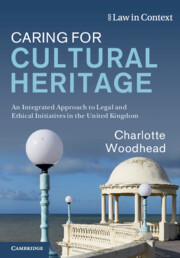 Caring for Cultural Heritage
Caring for Cultural Heritage Book contents
- Caring for Cultural Heritage
- The Law in Context Series
- Caring for Cultural Heritage
- Copyright page
- Dedication
- Contents
- Acknowledgements
- 1 Introduction
- 2 Caring for Cultural Heritage
- 3 Nested Practices of Care for Cultural Heritage
- 4 Translating How and Why Communities Care about Cultural Heritage
- 5 Creating Communities of Care
- 6 Quotidian Care
- 7 Navigating Harm to Cultural Heritage
- 8 The Rhetoric of Saving for the Nation
- 9 Challenging the Status quo
- 10 Conclusion
- Index
4 - Translating How and Why Communities Care about Cultural Heritage
Published online by Cambridge University Press: 09 November 2023
- Caring for Cultural Heritage
- The Law in Context Series
- Caring for Cultural Heritage
- Copyright page
- Dedication
- Contents
- Acknowledgements
- 1 Introduction
- 2 Caring for Cultural Heritage
- 3 Nested Practices of Care for Cultural Heritage
- 4 Translating How and Why Communities Care about Cultural Heritage
- 5 Creating Communities of Care
- 6 Quotidian Care
- 7 Navigating Harm to Cultural Heritage
- 8 The Rhetoric of Saving for the Nation
- 9 Challenging the Status quo
- 10 Conclusion
- Index
Summary
There is a great deal of varied terminology used to refer to cultural heritage, and this chapter explores how definitions of these terms translate into practice the importance of cultural heritage to communities that care about it. At times the UK’s system of law and non-law instruments can lead to a fragmented approach to caring for cultural heritage. In addition, there is a body of jurisprudence where a cultural heritage object, place or practice is at the centre of the dispute, but where general legal principles (rather than specialist cultural heritage laws) are applicable; it is the way in which the judges in these cases construct notions of cultural heritage which present an opportunity to fully appreciate the way in which the UK, as a community, imagines cultural heritage. Concepts such as value, significance, interest, importance, uniqueness and value all demonstrate the recognition of the varied ways in which communities in the UK care about cultural heritage. Although the importance of cultural heritage to a community’s identity is frequently cited, this concept is rarely, if ever, translated into legal or non-legal instruments in the UK. This chapter explores how the relationships between different communities and cultural heritage have been translated into the various nested practices of care.
Keywords
- Type
- Chapter
- Information
- Caring for Cultural HeritageAn Integrated Approach to Legal and Ethical Initiatives in the United Kingdom, pp. 101 - 125Publisher: Cambridge University PressPrint publication year: 2023


